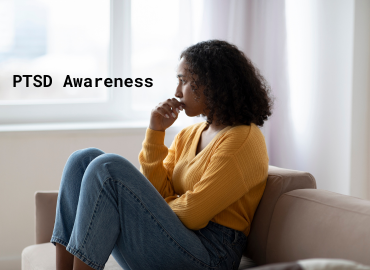PTSD Awareness
June is PTSD (post-traumatic stress disorder) Awareness Month. We regularly treat patients who present with symptoms of PTSD, often accompanying depression or anxiety. PTSD is one of the hardest conditions to live with. The effects of PTSD can range from discomfort caused by occasional triggers to a horrible part of their minute-by-minute life.
PTSD is defined by the Mayo Clinic as, “A mental health condition that’s triggered by a terrifying event— either experiencing it or witnessing it. Symptoms may include flashbacks, nightmares and severe
anxiety, as well as uncontrollable thoughts about the event.”
PTSD is commonly associated with veterans who have experienced the stressors of combat, like explosive detonations, witnessing death and destruction, and having to stay on top of the situation the whole time. But veterans are not the only ones who deal with PTSD. PTSD can be caused by events like these:
− Physical assault
− A natural disaster
− Childbirth
− A vehicle accident Symptoms of PTSD include:
− Racing and/or pounding pulse
− Trouble breathing
− Dizziness
− Dissociation
− Panic
− Vivid flashbacks or feelings of being in the traumatic situation(s) again
There is a subtype of PTSD called C-PTSD, or complex PTSD. The difference lies in the fact that C-PTSD is associated with chronic trauma that has a formative effect on how the affected individual develops.
Child abuse is a common cause.
What can individuals do to cope with PTSD? PTSD doesn’t have an easy fix, but support is available. An important factor is that isolation is PTSD’s best friend. Even though talking about it is uncomfortable,
support groups and talk therapy are two strong tools against PTSD. Medications like anti-psychotics can help make life easier to navigate. Some sufferers use aids like service dogs so they can function the way they want to. Many people with PTSD also use grounding techniques like object focus, sensory feedback, and attention diversion.
PTSD is a difficult, ugly thing, but it doesn’t have to rule your life. If this article resonates with you and you’ve been experiencing post-traumatic stress, contact your general physician. They’re a perfect place to start your treatment journey. They can do a physical evaluation, run tests, give you questionnaires to
fill out, and make referrals. General physicians are a wealth of resources. Then, contact us on our
website or call (585) 442-6960 for an appointment.




